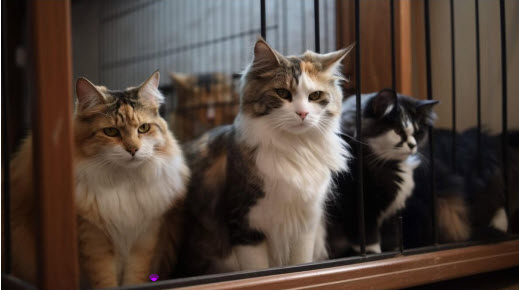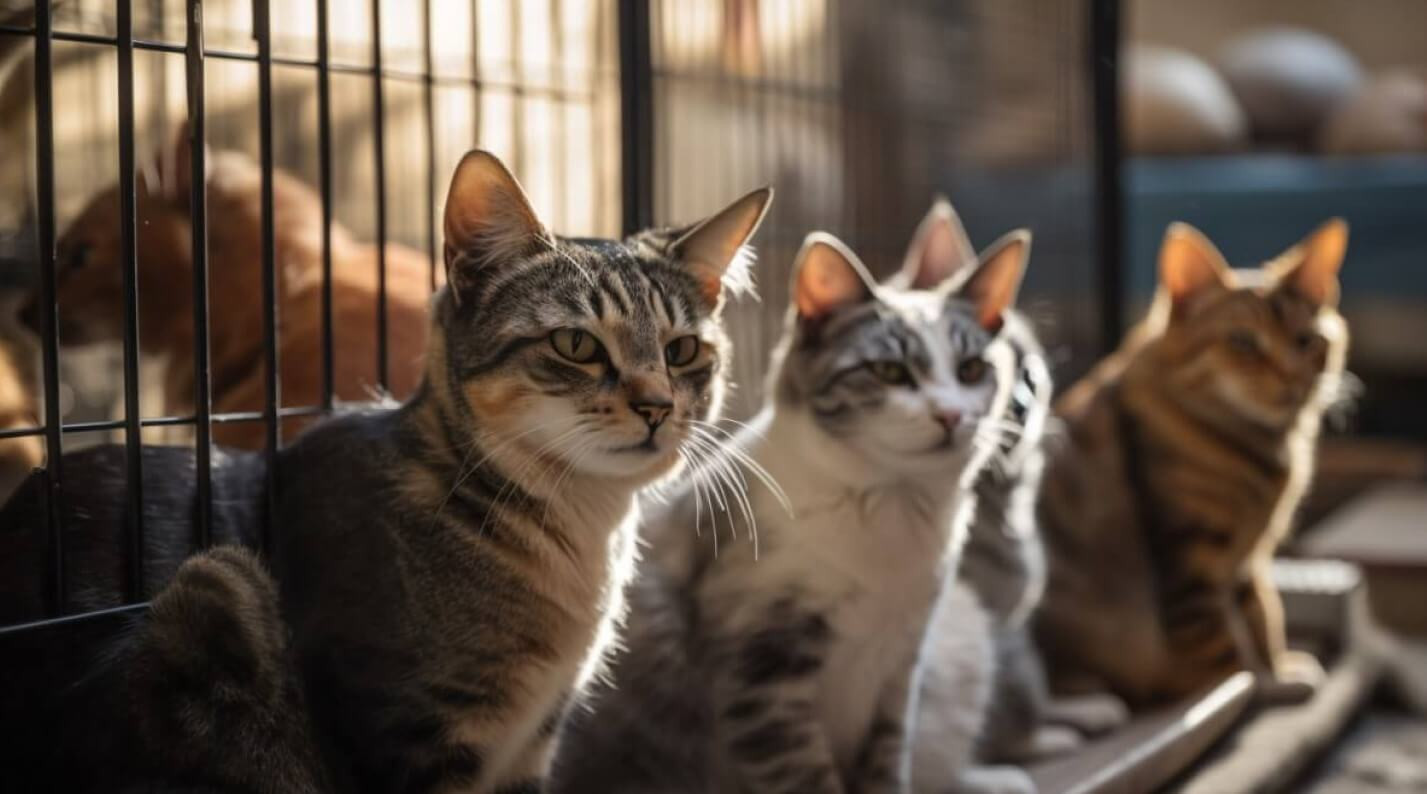Would you prefer to listen to a short podcast discussion about this article? Click on the audio below.
Adopting a cat is a big, serious commitment and a significant decision. Therefore, it is vital to consider what to expect and plan before bringing a new furry friend into your home.
Table of Contents
Guide to Adopting a Cat: Introduction
If you are adopting a cat for the first time, the first step in adopting a cat is to ensure you’re ready to make a lifelong commitment. Cats have an average lifespan of 10-15 years; during that time, they need proper healthcare, nutrition, and plenty of love and attention. So you need to consider the time and financial requirements of adopting a cat to ensure you can provide a stable and loving home.

When adopting a cat, it’s critical to research different breeds and personalities to find the perfect match for your lifestyle. For example, some cats are very active and require lots of playtime, while others are more laid-back and enjoy lounging around. Likewise, some cats do better in homes with children or other pets, while others prefer a quiet and calm environment. It’s crucial to consider these factors before adopting to ensure that you find a cat that fits well with your lifestyle and personality.
Before bringing your new kitty home, ensure you have all the necessary supplies. These supplies include a litter box, food and water dishes, a scratching post, toys, and a comfortable bed. You’ll also need to purchase quality food that meets your cat’s nutritional needs and schedule regular veterinary checkups to keep your cat healthy.
It’s also essential to prepare your home for your new feline companion. Cats are curious, and they love to explore their surroundings. However, they can be sensitive to unfamiliar noises or spaces. Therefore, creating a safe and secure environment for your cat is essential so they feel comfortable and at ease. Set up a designated area for your cat with its bed, litter box, and food and water dishes. Also, ensure that all hazardous items are out of reach and electrical cords are secured.
Adopting a Cat or Kitten: Requisites
Here’s a list of essential equipment you’ll need when adopting a cat:
Litter box and litter:
You’ll need at least one litter box and litter for your new cat. It’s best to start with one box per cat and place it in a quiet, accessible area of your home.
Food and water bowls:
You’ll need food and water bowls for your cat. Choose sturdy, easy-to-clean bowls that won’t tip over easily.
Cat food:
Your new cat will need food specific to their age, size, and health needs. Consult with your veterinarian for recommendations.
Cat carrier:
A carrier is necessary for transporting your cat to and from the veterinarian or other locations.
Scratching post:
Cats need to scratch to maintain their claws, so a scratching post is a must. Choose a sturdy, tall post that your cat can stretch on.
Toys:
Cats love to play, and having a variety of toys can help keep them entertained and mentally stimulated.
Bed:
A comfortable bed will allow your cat to relax and sleep.
Grooming tools:
You’ll need a brush, nail clippers, and, perhaps, a comb to keep your cat looking and feeling its best.
ID tag:
It’s important to have an identification tag on your cat’s collar in case they get lost.
Cleaning supplies:
You’ll need cleaning supplies to clean up any accidents or spills and clean the litter box regularly.
Here are some possible expenses to consider when adopting a cat:
Adoption fees:
Many animal shelters and rescue organizations charge an adoption fee for cats, which can vary depending on the organization and the cat’s age and breed.
Veterinary expenses:
You must take your new cat to the veterinarian for a checkup, vaccinations, and any necessary medical treatments. You may also want to consider getting your cat spayed or neutered if they haven’t already been.
Cat food:
You will need to purchase food for your cat, which can vary in cost depending on the quality and brand you choose.
Pet insurance:
Consider getting pet insurance to help cover unexpected veterinary expenses.
Adopting a Cat: Summary
In conclusion, if you are thinking about adopting a cat, it is a significant responsibility that requires careful consideration and planning. The process of adopting a cat is researching different breeds and personalities, gathering necessary supplies, and preparing your home are essential steps toward providing your new furry friend with a happy and fulfilling life. By planning and preparing, you’ll be well on your way to creating a lifetime bond and discovering the benefits of adopting a cat.
If you require any assistance with this article, please do not hesitate to Contact Us

Help support the Cats Protection League with a monthly donation
What is the best age to adopt a cat?
The ideal age to adopt a kitten is 12 weeks as they are more likely to be healthy at this age. However, if you prefer adopting an adult cat, consider a cat over 6 months of age that has learned to be by itself or is comfortable being the only cat in the household. Additionally, cats typically start to mellow and settle into their personality between 2-3 years old. However, indoor cats can live to be 15-20 years old, so even an 8-year-old cat could make a great addition to your family.
How long does it take for a cat to adjust to a new owner?
It generally takes a cat about a week to a week and a half to adjust to a new home and owner. During this period, it is recommended to confine the cat indoors to help them get used to their surroundings and to establish comfort and safety in their new environment. However, every cat is unique, and some may adjust more quickly or take longer than others. Patience and consistency are key to helping your new cat feel comfortable with you as their new owner.
What are the benefits of adopting an older cat versus a kitten?
Adopting an older cat instead of a kitten can have numerous benefits. Senior cats tend to have lower energy levels and may be more suited for a calmer household. They also tend to require less attention and training than kittens. Additionally, adopting an older cat can be a rewarding experience as they are often in greater need of a loving home.





















